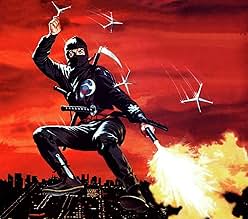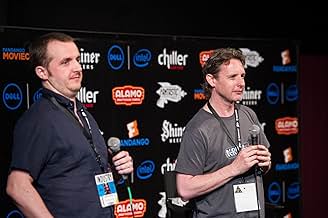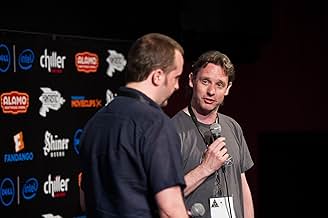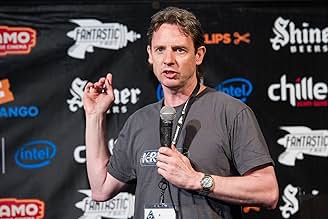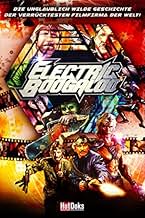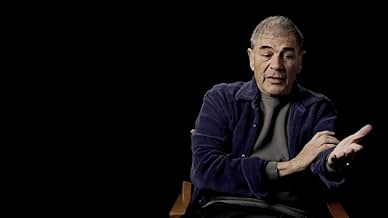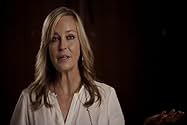Electric Boogaloo
Original title: Electric Boogaloo: The Wild, Untold Story of Cannon Films
IMDb RATING
7.4/10
6.2K
YOUR RATING
The history of the independent film company, The Cannon Film Group, Inc.The history of the independent film company, The Cannon Film Group, Inc.The history of the independent film company, The Cannon Film Group, Inc.
Menahem Golan
- Self - Cannon Chairman
- (archive footage)
Itzik Kol
- Self - Production Executive
- (archive footage)
Roni Ya'ackov
- Self - Production Executive
- (as Rony Yakov)
Yftach Katzur
- Self - Actor
- (as Yiftach Katzur)
- Director
- Writer
- All cast & crew
- Production, box office & more at IMDbPro
Featured reviews
ELECTRIC BOOGALOO: THE WILD, UNTOLD STORY OF CANNON FILMS is a documentary that does exactly what it says on the tin. That is, to celebrate the wild heydays of Cannon Films, a 1980s production house who put out some of the biggest, silliest, cheesiest, and most effects-fuelled films of that decade.
It's a rise-and-fall tale, brought to live via copious clips and lots of interview footage with various stars, directors, and producers who were involved with the films themselves. Thus for a cinema fan - especially somebody who's seen a lot of the films, like myself - it's a real visual treat. The film is a celebration of the Golan and Globus approach - which is to churn out film after film, hoping one or two of them will be a success - and the eventual hubris which saw the company's downfall. It's constantly funny as well, which really helps.
It's a rise-and-fall tale, brought to live via copious clips and lots of interview footage with various stars, directors, and producers who were involved with the films themselves. Thus for a cinema fan - especially somebody who's seen a lot of the films, like myself - it's a real visual treat. The film is a celebration of the Golan and Globus approach - which is to churn out film after film, hoping one or two of them will be a success - and the eventual hubris which saw the company's downfall. It's constantly funny as well, which really helps.
For those of us that grew up in the VHS age of the 1980's, Cannon Films was a studio that provided us with much of our movie watching excitement. New Year's Evil (1980), Enter the Ninja (1981), Invasion U.S.A. (1985) and Cobra (1986) are just a few of the titles that helped propel Cannon Films in its heyday and is the focus of the new documentary Electric Boogaloo: The Wild, Untold Story of Cannon Films.
Israeli cousins Menahem Golan and Yoram Globus bought Cannon films for $500,000 in 1979 and created a film sausage factory where films were fast tracked to the screen based on high risk concepts or eye-catching movie posters ("At Cannon, 52 pictures a year wasn't enough").
Immediately, the two relatives saw a market for B-movie action films and started to build their empire on the backs of such franchises as Death Wish and various Chuck Norris vehicles such as Delta Force and the Missing in Action series.
Director Mark Hartley is no stranger to documenting film on film. Harley directed Not Quite Hollywood: The Wild, Untold Story of Ozploitation in 2008 and Machete Maidens Unleashed! in 2010. Hartley has a formula that works when exploring niche genres in film and stays the course with Electric Boogaloo: The Wild, Untold Story of Cannon Films.
Clips of films (everything from American Ninja, Texas Chainsaw Massacre II and Bloodsport are intertwined with interviews from familiar faces such as Molly Ringwald, Alex Winter, Dolph Lundgren and Richard Chamberlain. The doc takes us back to the early 80's and Hartley covers as many bases as possible when docu-reminiscing through such mindless yet wildly entertaining films that shaped many of our youths.
For a walk down memory lane, Electric Boogaloo: The Wild, Untold Story of Cannon Films is one hell of a fun ride. But it's a safe ride and one that doesn't give us any real deep deep deep insight into anything and just skims the surface of historical reference. When Electric Boogaloo does try and dive beyond an E: True Hollywood Story expose (such as a bit on diva Sharon Stone) it is met with a shrug of the shoulders and a 'Yea, not surprised' reaction from a target audience that was much more appreciative when the film simply highlighted films that we thought were even greater than the invention of sliced bread.
Electric Boogaloo: The Wild, Untold Story of Cannon Films is a tad overlong at 105 minutes but breathes new life into their decaying body with every newly introduced film that sparks memories of an age long gone. We do get educated on how now more popular directors got their start (Jean-Luc Godard with King Lear, Barbet Schroder with Barfly and John Cassavetes with Love Streams) with Cannon much like Roger Corman started the careers of Ron Howard, Martin Scorcese and James Cameron. And it was interesting to see the downfall of the company with big budget backed busts such as Superman IV: The Quest for Peace and Masters of the Universe.
Menahem Golan (who recently passed away in August 2014) and Yoram Globus did not participate in the documentary so any opinion of their business practices are told by the many interviewed stars and staff that were involved in their pictures including Cassandra Peterson (Elvira), Bo Derek, Michael Dudikoff and Elliot Gould.
Electric Boogaloo: The Wild, Untold Story of Cannon Films felt formulaic. It went through the motions and tired harder to tap into our memories than it did trying to tap into the backlots and secrets surrounding the studio (after all, it is titled 'The Wild, Untold Story'). Still, for someone who has seen every one of the films that was displayed on screen – and some, multiple times - Electric Boogaloo: The Wild, Untold Story of Cannon Films was like putting on your favorite pair of shoes that have long outlived their usage date. It had me reaching into my VHS collection to re-screen films I have not paid attention to in decades. And for that, Mark Hartley deserves credit.
www.killerreviews.com
Israeli cousins Menahem Golan and Yoram Globus bought Cannon films for $500,000 in 1979 and created a film sausage factory where films were fast tracked to the screen based on high risk concepts or eye-catching movie posters ("At Cannon, 52 pictures a year wasn't enough").
Immediately, the two relatives saw a market for B-movie action films and started to build their empire on the backs of such franchises as Death Wish and various Chuck Norris vehicles such as Delta Force and the Missing in Action series.
Director Mark Hartley is no stranger to documenting film on film. Harley directed Not Quite Hollywood: The Wild, Untold Story of Ozploitation in 2008 and Machete Maidens Unleashed! in 2010. Hartley has a formula that works when exploring niche genres in film and stays the course with Electric Boogaloo: The Wild, Untold Story of Cannon Films.
Clips of films (everything from American Ninja, Texas Chainsaw Massacre II and Bloodsport are intertwined with interviews from familiar faces such as Molly Ringwald, Alex Winter, Dolph Lundgren and Richard Chamberlain. The doc takes us back to the early 80's and Hartley covers as many bases as possible when docu-reminiscing through such mindless yet wildly entertaining films that shaped many of our youths.
For a walk down memory lane, Electric Boogaloo: The Wild, Untold Story of Cannon Films is one hell of a fun ride. But it's a safe ride and one that doesn't give us any real deep deep deep insight into anything and just skims the surface of historical reference. When Electric Boogaloo does try and dive beyond an E: True Hollywood Story expose (such as a bit on diva Sharon Stone) it is met with a shrug of the shoulders and a 'Yea, not surprised' reaction from a target audience that was much more appreciative when the film simply highlighted films that we thought were even greater than the invention of sliced bread.
Electric Boogaloo: The Wild, Untold Story of Cannon Films is a tad overlong at 105 minutes but breathes new life into their decaying body with every newly introduced film that sparks memories of an age long gone. We do get educated on how now more popular directors got their start (Jean-Luc Godard with King Lear, Barbet Schroder with Barfly and John Cassavetes with Love Streams) with Cannon much like Roger Corman started the careers of Ron Howard, Martin Scorcese and James Cameron. And it was interesting to see the downfall of the company with big budget backed busts such as Superman IV: The Quest for Peace and Masters of the Universe.
Menahem Golan (who recently passed away in August 2014) and Yoram Globus did not participate in the documentary so any opinion of their business practices are told by the many interviewed stars and staff that were involved in their pictures including Cassandra Peterson (Elvira), Bo Derek, Michael Dudikoff and Elliot Gould.
Electric Boogaloo: The Wild, Untold Story of Cannon Films felt formulaic. It went through the motions and tired harder to tap into our memories than it did trying to tap into the backlots and secrets surrounding the studio (after all, it is titled 'The Wild, Untold Story'). Still, for someone who has seen every one of the films that was displayed on screen – and some, multiple times - Electric Boogaloo: The Wild, Untold Story of Cannon Films was like putting on your favorite pair of shoes that have long outlived their usage date. It had me reaching into my VHS collection to re-screen films I have not paid attention to in decades. And for that, Mark Hartley deserves credit.
www.killerreviews.com
I remember pretty clearly the Cannon Films logo and its distinctive loud crashing sound accompaniment that introduced so many films I watched on video in my teenage years in the 80's. I never really thought too much about it until now, having seen this wildly entertaining documentary about these B movie mavericks. A few years ago I saw another similarly fun documentary about specific genre films, Machete Maidens Unleashed, a film also helmed by the same director Mark Hartley. Well, he sure has a knack for these things because this one follows a pretty similar template where we get to hear anecdotes from a large selection of people who were involved in the making of these flicks and, better still, many clips from a wide ranging assortment of the crazy, fun and stupid movies that Cannon became famous for. They were run by two Israelis Menahem Golan and Yoram Globus (neither of whom appeared in the documentary deciding in true Cannon style to make their own documentary on the subject simultaneously).
Their main decade was the 80's where they unleashed a huge number of low budget movies from horror to sexploitation to action and dance movies plus a whole lot in between. They were mainly known to be purveyors of schlock entertainment and with good reason as, despite releasing some acclaimed films and working with some important directors such as John Cassavetes and Jean Luc Godard, they were in the main responsible for straight-ahead genre pictures. Their films have a refreshing absence of any political correctness whatsoever and often feature copious amounts of nudity and violence, quite often at the same time as in the case of some notorious films in their catalogue such as Death Wish II (1982). Other times they featured laughably bad special effects like can be seen in Hercules (1983), some were blatant bandwagon jumpers like the hip hop dance film Breakin' (1984), they also released the notoriously sexy Bo Derek vehicle Bolero (1984) which so outraged MGM who had set up a distribution deal with them, they released the very silly sequel The Texas Chainsaw Massacre 2 (1986), while some of their output simply defies description like the extremely strange and silly musical The Apple (1980). They made many Charles Bronson and Chuck Norris vehicles; they discovered Jean Claude Van Damme and Dolph Lundgren and gave a platform for cult directors like Tobe Hooper to make movies. Things only started to go wrong in 1987 when they began to over-reach themselves and spent multi-millions on three box office disasters - the Sylvester Stallone film Over the Top which was about...arm wrestling; the superhero movie Superman IV: The Quest for Peace which was very expensive for them but not expensive enough to execute good enough special effects resulting in a laughable film; and finally Masters of the Universe, a film based on the popular 80's toys. So there is a dramatic story arc to this, which helps it function as a narrative but in the main it works so well simply because it is chock-full of entertaining clips from an array of movies and has some funny observations from the people involved. For any B movie lover this really is a must. And what's more, you are guaranteed to be led to seek out a few new flicks off the back of it.
Their main decade was the 80's where they unleashed a huge number of low budget movies from horror to sexploitation to action and dance movies plus a whole lot in between. They were mainly known to be purveyors of schlock entertainment and with good reason as, despite releasing some acclaimed films and working with some important directors such as John Cassavetes and Jean Luc Godard, they were in the main responsible for straight-ahead genre pictures. Their films have a refreshing absence of any political correctness whatsoever and often feature copious amounts of nudity and violence, quite often at the same time as in the case of some notorious films in their catalogue such as Death Wish II (1982). Other times they featured laughably bad special effects like can be seen in Hercules (1983), some were blatant bandwagon jumpers like the hip hop dance film Breakin' (1984), they also released the notoriously sexy Bo Derek vehicle Bolero (1984) which so outraged MGM who had set up a distribution deal with them, they released the very silly sequel The Texas Chainsaw Massacre 2 (1986), while some of their output simply defies description like the extremely strange and silly musical The Apple (1980). They made many Charles Bronson and Chuck Norris vehicles; they discovered Jean Claude Van Damme and Dolph Lundgren and gave a platform for cult directors like Tobe Hooper to make movies. Things only started to go wrong in 1987 when they began to over-reach themselves and spent multi-millions on three box office disasters - the Sylvester Stallone film Over the Top which was about...arm wrestling; the superhero movie Superman IV: The Quest for Peace which was very expensive for them but not expensive enough to execute good enough special effects resulting in a laughable film; and finally Masters of the Universe, a film based on the popular 80's toys. So there is a dramatic story arc to this, which helps it function as a narrative but in the main it works so well simply because it is chock-full of entertaining clips from an array of movies and has some funny observations from the people involved. For any B movie lover this really is a must. And what's more, you are guaranteed to be led to seek out a few new flicks off the back of it.
Fairly interesting documentary charts the rise and fall of The Cannon Group, a company made popular by two Israeli cousins, Menahem Golan and Yoram Globus. For the most part, they didn't exactly make prestige films, but they did an uncanny job of cranking out scores of B pictures that were often quite entertaining, no matter if the level of quality wasn't the highest. After a number of years, they did leave an impression on the film industry, if only for their impressive knack for "pre-selling" movies, using no more than posters, titles, and concepts.
This reasonably entertaining production is from Mark Hartley, who's left his own indelible stamp on the industry by making these kinds of films; previously, he'd done documentaries on the cult and exploitation pictures of both Australia ("Not Quite Hollywood") and the Philippines ("Machete Maidens Unleashed"). Instead of having a narrator to sort of take us step by step through this tale, a series of sit down interviews play in quick succession, with various cast and crew of numerous Cannon efforts giving their thoughts on the movies that they made. Some of the interviews are quite engaging; people interviewed include Franco Nero, Sybil Danning, Laurene Landon (it's actually rather distressing seeing her mime setting fire to a copy of "America 3000"), Boaz Davidson, David Engelbach, Christopher Pearce, Richard Edlund, Tobe Hooper, Greydon Clark, Alex Winter, and others.
After "Electric Boogaloo" is over, one does feel that they've gotten a pretty vivid, "warts and all" picture of the Golan & Globus personalities. Golan was the real character: volatile, demanding, opinionated. Globus was the somewhat more restrained of the two, the one who handled more business oriented duties. Ultimately, their hubris caught up with them. Although they could on occasion produce something truly special ("Runaway Train"), they simply ended up getting too ambitious, and getting in over their heads.
Many of the interviewees do seem to hold Cannon product in quite a bit of contempt, which is unfortunate, because while much of it may not be Oscar baiting material, it was, most of the time, a good deal of fun. If you're like this viewer, The Cannon Group has given you many hours of viewing pleasure with their B grade action movies, thrillers, sci-fi, and horror features.
In the end, it's quite telling that Golan & Globus declined to participate in this documentary, instead beating it to the punch with their OWN non fiction feature titled "The Go Go Boys".
Seven out of 10.
This reasonably entertaining production is from Mark Hartley, who's left his own indelible stamp on the industry by making these kinds of films; previously, he'd done documentaries on the cult and exploitation pictures of both Australia ("Not Quite Hollywood") and the Philippines ("Machete Maidens Unleashed"). Instead of having a narrator to sort of take us step by step through this tale, a series of sit down interviews play in quick succession, with various cast and crew of numerous Cannon efforts giving their thoughts on the movies that they made. Some of the interviews are quite engaging; people interviewed include Franco Nero, Sybil Danning, Laurene Landon (it's actually rather distressing seeing her mime setting fire to a copy of "America 3000"), Boaz Davidson, David Engelbach, Christopher Pearce, Richard Edlund, Tobe Hooper, Greydon Clark, Alex Winter, and others.
After "Electric Boogaloo" is over, one does feel that they've gotten a pretty vivid, "warts and all" picture of the Golan & Globus personalities. Golan was the real character: volatile, demanding, opinionated. Globus was the somewhat more restrained of the two, the one who handled more business oriented duties. Ultimately, their hubris caught up with them. Although they could on occasion produce something truly special ("Runaway Train"), they simply ended up getting too ambitious, and getting in over their heads.
Many of the interviewees do seem to hold Cannon product in quite a bit of contempt, which is unfortunate, because while much of it may not be Oscar baiting material, it was, most of the time, a good deal of fun. If you're like this viewer, The Cannon Group has given you many hours of viewing pleasure with their B grade action movies, thrillers, sci-fi, and horror features.
In the end, it's quite telling that Golan & Globus declined to participate in this documentary, instead beating it to the punch with their OWN non fiction feature titled "The Go Go Boys".
Seven out of 10.
Informative and enjoyable documentary about the rise and fall of Cannon Films, a beloved part of my youth. Cannon made many cheesy and low-brow movies and this doc covers most of them and, yes, insults them...a lot. I admit as a Cannon fan it bristled a bit at first but I know that their films were, more often than not, trash. But they were also, more often than not, entertaining trash. The tone of the documentary is lighthearted, with many people sharing their funny anecdotes about the crazy antics of Menahem Golan and Yoram Globus (particularly Golan). There are some nasty jabs here and there, with the Most Sour award going to former MGM exec Frank Yablans, who pulled no punches in what he thought of Cannon's output (Mr. Yablans passed away shortly after this was released). Most of the talking heads are behind-the-scenes types but there are many actors and directors also interviewed, including Molly Ringwald, Catherine Mary Stewart, Alex Winter, Franco Nero, Dolph Lundgren, Richard Chamberlain, Franco Zeffirelli, and Sybil Danning. Not a lot of time is spent on many of my favorite Cannon movies but that's to be expected given the amount of films they had to cover in the time they had. They did an admirable job of covering the major Cannon films and they told the story of Golan-Globus well. The ample use of film clips is appreciated, as is the brisk pace. I think it's something every Cannon fan should see, although be warned if you're sensitive or protective about their films you may be put off by some of it, such as "Bill S. Preston, Esquire" acting as though he has a leg to stand on commenting on Charles Bronson's acting ability. Minor annoyances aside, it's a fun look back at Cannon with some interesting trivia for those who may not be familiar with what went on during the making of some of their favorite '80s B movies.
Did you know
- TriviaMichael Winner was going to be interviewed for the documentary, but he died before production started on it.
- Quotes
Roni Ya'ackov: She said, "Menahem, I can't do it. I'm dying." He said, "Do it... then die!"
- ConnectionsEdited from Omnibus: The Last Moguls (1986)
Details
- Release date
- Countries of origin
- Official site
- Language
- Also known as
- Electric Boogaloo: The Wild, Untold Story of Cannon Films
- Production companies
- See more company credits at IMDbPro
Box office
- Gross worldwide
- $864
- Runtime1 hour 46 minutes
- Color
- Aspect ratio
- 1.78 : 1
Contribute to this page
Suggest an edit or add missing content



